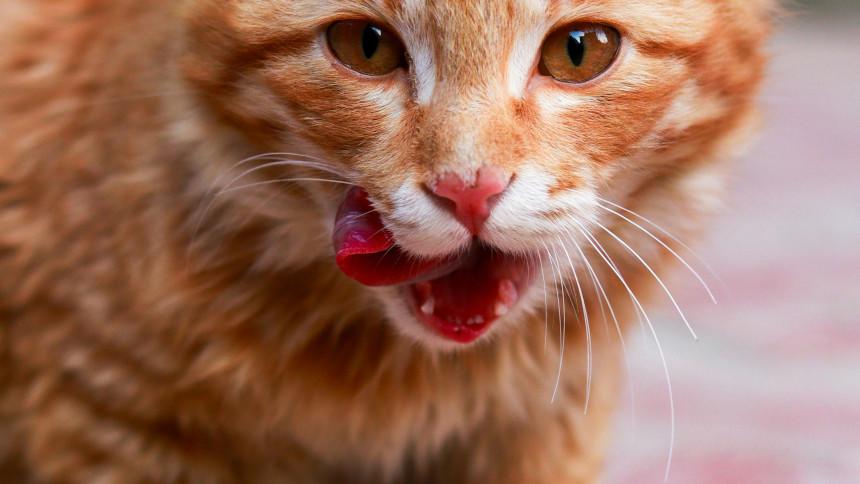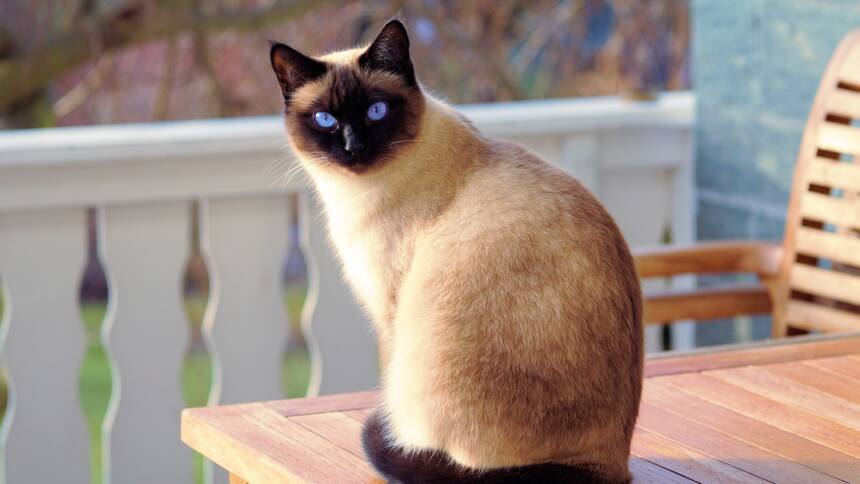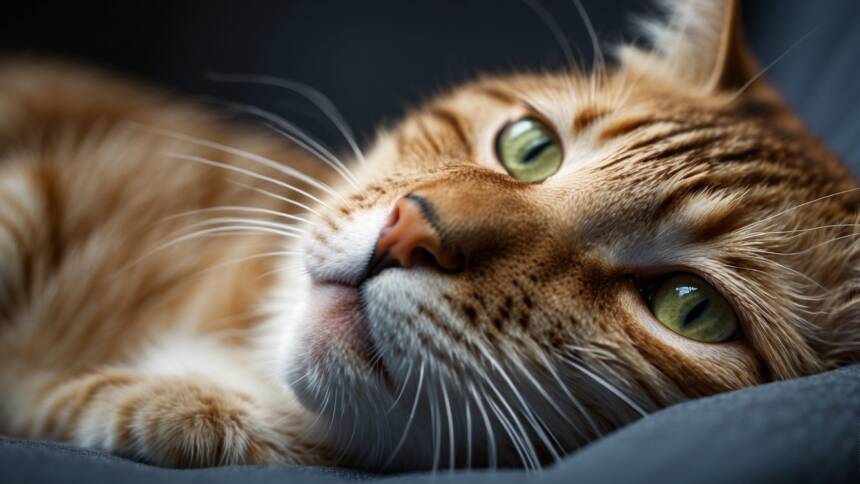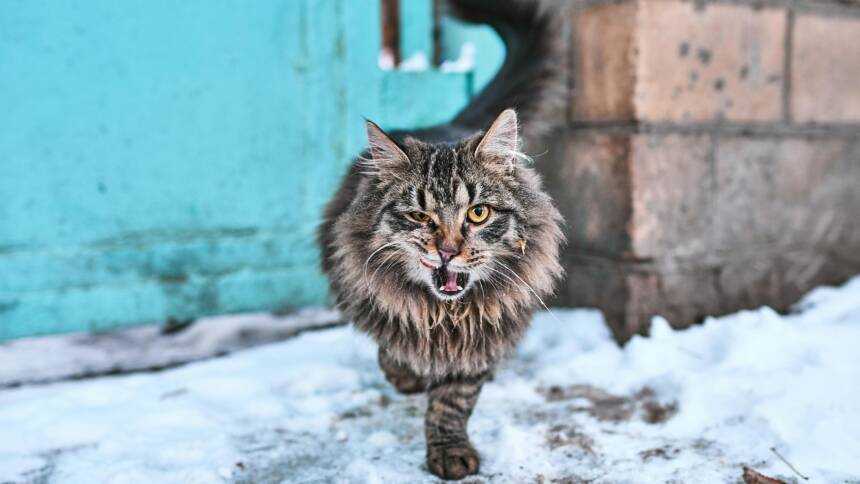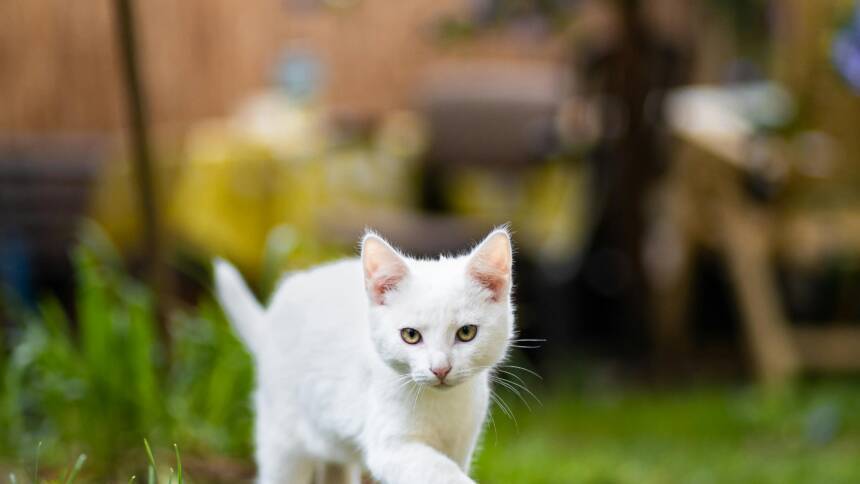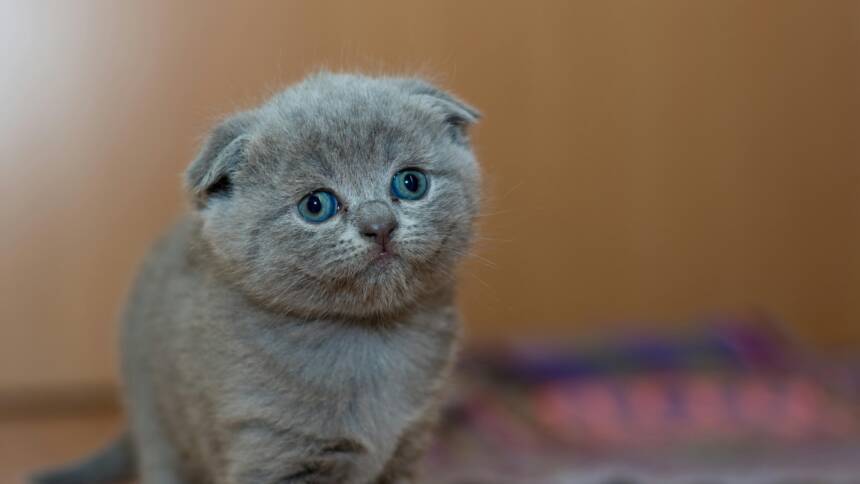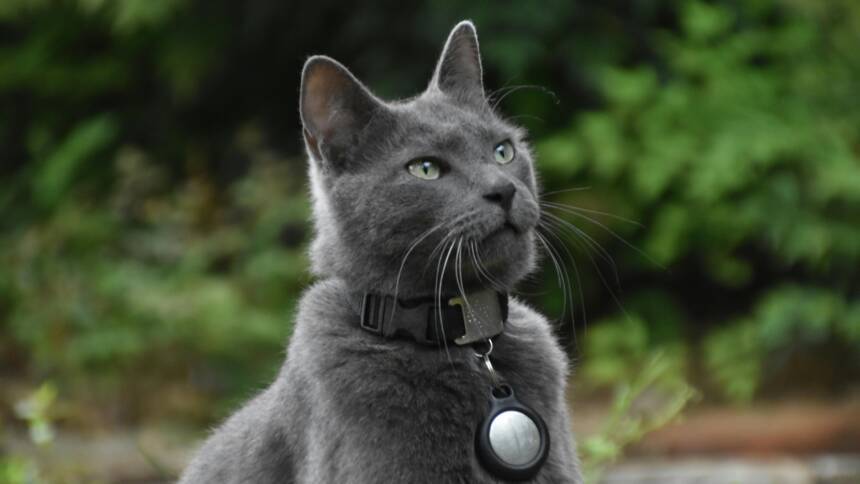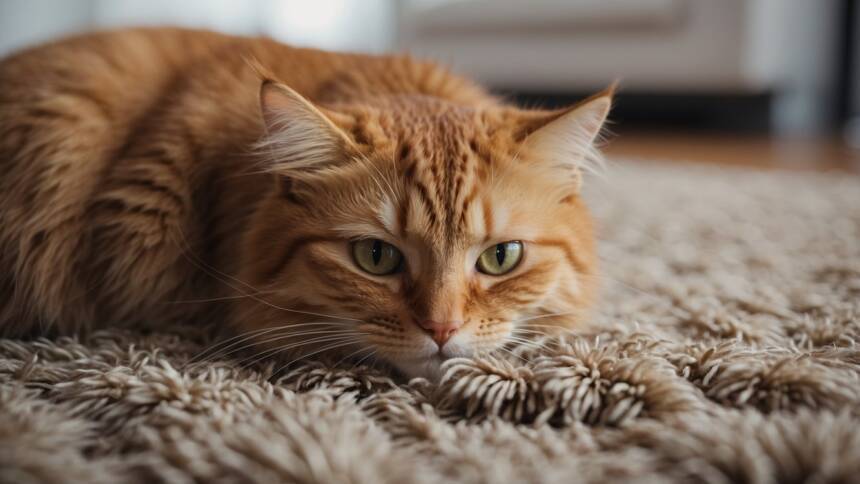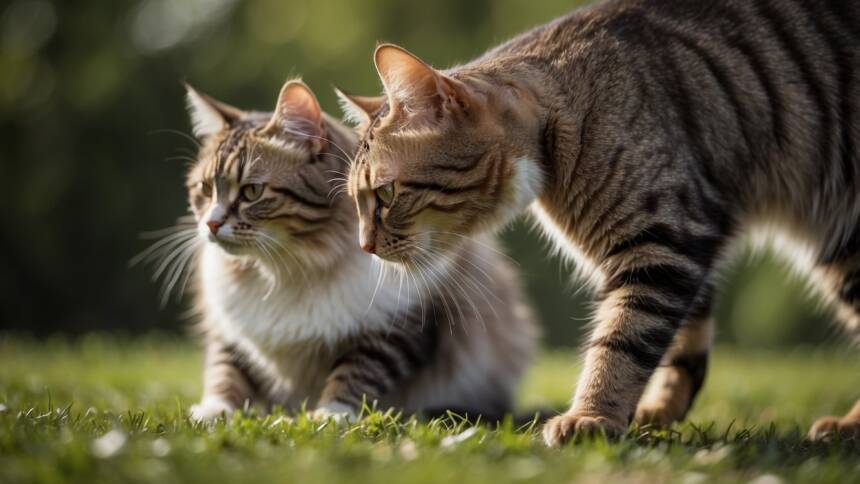Cats are known for their meticulous grooming habits, and licking their lips is a commonly observed behavior in felines. This action can result from various conditions ranging from benign to serious. Understanding why a cat licks its lips is important for cat owners, as it can be a subtle sign of underlying health issues or emotional states.
Normal grooming or a response to tasty food can lead some cats to lick their lips. However, if a cat frequently licks its lips, it could indicate discomfort or pain, especially if accompanied by other changes in behavior or appetite. Oral health issues such as dental pain, periodontal disease, or other problems in the mouth can lead to excessive lip licking.
Beyond oral health, digestive upset, including nausea or the ingestion of something disagreeable, might cause a cat to lick its lips excessively. In some cases, anxiety or stress triggers this behavior, manifesting as a part of a larger pattern of stress-related behaviors. Observing the context in which a cat licks its lips is crucial for identifying potential causes and determining whether a veterinary consultation is necessary.
Understanding Cat Behavior
In assessing why cats lick their lips, it’s important to distinguish between ordinary grooming habits and behaviors indicative of stress or anxiety.
Normal Grooming and Licking
Cats are meticulous creatures that engage in grooming routinely as a part of their daily activities. Grooming serves multiple functions: it helps cats to remove loose fur, clean themselves after eating, and regulate their body temperature. During grooming, cats often lick their lips to remove food particles or scents, reinforcing their cleanliness.
Signs of Anxiety and Stress
On the other hand, lip licking in cats can signal stress or anxiety. This manifestation of body language can be seen in scenarios where cats are uncomfortable or unable to escape a perceived threat, known as displacement behavior. For instance, a vet visit may provoke such a stress response, displaying lip licking as a coping mechanism. Paying attention to these signals is crucial in understanding and supporting the emotional well-being of a feline.
Common Health Issues Indicated by Lip Licking
Lip licking in cats can be a subtle signal pointing to several health issues, particularly dental concerns and gastrointestinal problems. A vigilant owner should observe the frequency and context of lip licking as it may warrant a consultation with a veterinarian.
Dental Concerns
Oral pain in cats is often due to dental disease, which can range from mild gingivitis to severe conditions like tooth resorption and oral tumors. Signs such as licking lips, poor appetite, or visible discomfort while eating can be indicators of dental distress. A veterinarian’s examination is crucial to address these issues which, if untreated, can lead to significant health complications.
- Gingivitis: Red, swollen gums
- Dental Disease: Often includes tartar buildup and bad breath
- Tooth Resorption: Can result in visible tooth damage or loss
- Oral Tumors: May cause swelling or masses in the mouth
Gastrointestinal Problems
Cats may start licking their lips excessively due to gastrointestinal issues, such as an upset stomach, nausea, or vomiting. These symptoms can also be associated with systemic conditions like kidney disease or diabetes, which affect overall health and can manifest through gastrointestinal distress. Early recognition and veterinary intervention can aid in managing these health problems.
- Upset Stomach: Look for lip licking combined with changes in eating habits.
- Nausea: May cause increased saliva leading to lip licking.
- Vomiting: Persistent vomiting with lip licking requires immediate veterinary care.
- Systemic Diseases: Conditions like kidney disease or diabetes might have associated gastrointestinal symptoms.
Regular check-ups with a veterinarian are essential for maintaining a cat’s health and well-being, as early detection of these conditions can lead to more effective treatment and a better prognosis.
Emergency Situations Requiring Immediate Care
Cats exhibiting persistent lip licking along with other concerning symptoms may be facing a health emergency. Prompt identification and veterinary care can be crucial to their well-being.
Recognizing Serious Conditions
Persistent lip-licking in cats can be a sign of numerous conditions, some of which are emergencies.
Serious conditions include:
- Pain or discomfort can manifest as lip licking and may be due to dental issues like abscesses.
- Neurological issues such as focal seizures might cause repetitive behaviors, including excessive grooming or lip licking.
- Dehydration or fever can cause dryness of the mouth, leading to lip licking.
- Physical ailments stemming from foreign bodies, tumors, or cancer may also be the cause.
- Gastrointestinal problems may lead to nausea, resulting in lip licking and excessive salivation.
Symptoms indicating these conditions may also be accompanied by changes in behavior such as increased meowing, hiding, or lethargy.
When to Visit the Vet
A cat exhibiting the following signs should be taken to a veterinarian immediately:
| Symptom | Potential Emergency |
|---|---|
| Sudden onset of symptoms | Possible acute condition |
| Lethargy | Sign of serious illness |
| Excessive salivation | Indicates nausea or pain |
| Hiding or meowing | Indicates distress |
| Inability to urinate | Life-threatening condition |
Timely action is essential in emergencies. When uncertain, it’s advised to err on the side of caution and seek immediate veterinary care to ensure the best outcome for the feline.
Identifying Behavioral Causes of Lip Licking
Lip licking in cats may often be a sign of underlying behavioral issues, particularly those associated with stress and anxiety. By understanding and identifying these causes, owners can better address their cat’s needs.
Displacement Behaviors and Habits
Displacement Behaviors are actions a cat performs to relieve mild stress or frustration. For example, a cat may start licking its lips in situations where it feels conflicted or uncertain. These behaviors can become habitual if the cat repeatedly experiences anxiety-inducing situations.
- Some common habit triggers include:
- Change in the environment
- Introduction of new pets
- Loud noises
- Unfamiliar people
Stress-Related Responses
Stress-Related Responses in cats often include behavioral changes. When a cat is under significant stress, it may excessively lick its lips due to the anxiety this state induces. Stress can arise from a variety of sources, such as fear of predators, changes in routine, or the presence of threats within their territory.
- Signs that lip licking is stress-related:
- Accompanied by hiding or avoidance behaviors
- Follows incidents that may scare or upset the cat
Continual monitoring and understanding of a cat’s environmental and social context will aid in managing stress-induced lip licking and any potential compulsive disorders that may develop if such stress is not mitigated.
Preventative Measures and Home Monitoring
Proactive prevention and diligent home observation are pivotal for a cat owner to ensure the health and well-being of their feline companions. Regular check-ups and careful monitoring of daily behaviors can help detect and prevent health issues that may cause cats to lick their lips excessively.
Regular Veterinary Check-Ups
To safeguard a cat’s health, regular veterinary appointments are essential. These check-ups allow for early detection of potential health issues, including those that might lead to symptoms like frequent lip licking. An annual wellness exam should include:
- Dental Check: To look for signs of dental problems, which can cause pain and result in lip licking.
- Comprehensive Examination: For early diagnosis of conditions such as allergies or infections that could prompt such behaviors.
During these visits, the veterinarian can also offer advice on maintaining a cat’s dental hygiene and overall health to mitigate the risks of such behaviors manifesting.
Daily Observations
A careful daily monitoring routine helps cat lovers stay attuned to their pet’s health. Central to this is understanding and recognizing a cat’s normal behaviors and body language. Elements to monitor include:
- Appetite: Changes can indicate dental issues or gastrointestinal discomfort.
- Grooming Habits: Excess grooming, especially around the face, can be telling.
- Body Language: A cat that’s hiding or showing signs of lethargy may be stressed or ill.
A straightforward log or table can be helpful for tracking these observations:
| Date | Appetite | Grooming Behavior | Body Language Notes |
|---|---|---|---|
| YYYY-MM-DD | Normal/Decreased/Increased | Normal/Excessive | Relaxed/Stressed/Hiding |
By maintaining such records, a cat owner can provide their veterinarian with accurate information to help diagnose any issues swiftly, reducing the risk of more serious problems developing.
Exploring Specific Conditions and Diseases
In examining the reasons behind a cat licking its lips, it’s important to consider specific oral diseases and gastrointestinal disorders, each of which can elicit this behavior due to irritation or discomfort.
Oral Diseases
Cats may excessively lick their lips due to a range of oral diseases that cause pain and discomfort.
- Gingivitis: This is the inflammation of the gums which can lead to redness and swelling.
- Periodontitis: A more advanced stage of gum disease, this affects the structures supporting the teeth and can result in tooth loss.
- Tartar Buildup: Accumulation of tartar can lead to irritation and infection.
- Tumors: Oral tumors may not be immediately visible but can cause significant discomfort.
| Condition | Description | Symptoms |
|---|---|---|
| Infections | Bacterial or viral infections leading to inflammation. | Swelling, bad breath. |
| Tumors | Abnormal growths that can be benign or malignant (cancerous). | Lump or mass in the mouth. |
| Dental Issues | Broken teeth, cavities, or general tooth decay. | Visible damage, avoidance of food. |
Gastrointestinal Disorders
Discomfort stemming from gastrointestinal disorders can result in a cat licking its lips due to nausea or an upset stomach.
- Kidney Disease: Can cause increased nausea and vomiting.
- Cancer: Gastrointestinal cancers might lead to systemic symptoms including nausea.
- Upset Stomach: A general term for discomfort in the digestive tract which can be due to various conditions including infections or dietary indiscretion.
| Condition | Symptoms |
|---|---|
| Nausea | Frequent lip licking, salivation. |
| Vomiting | Expulsion of stomach contents. |
| Gastrointestinal | Discomfort in the belly, changes in appetite, weight loss. |
It is imperative for a veterinarian to assess a cat displaying these symptoms to ensure accurate diagnosis and appropriate treatment.
Treatment and Care for Affected Cats
When a cat displays excessive lip licking, it’s crucial to identify and treat the underlying cause. A veterinarian will determine the most appropriate treatment that may involve medications, therapies, or dietary management.
Medications and Therapies
- Antibiotics: If a respiratory infection is diagnosed, the vet might prescribe antibiotics to combat bacterial infections.
- Antihistamines: For cats with allergies causing discomfort and lip licking, antihistamines can provide relief.
- Dental Treatment: Dental issues may require professional cleaning or tooth extractions performed by a veterinarian focusing on oral health.
- Pain Management: Cats in pain might lick their lips frequently. Pain medication or anti-inflammatory drugs can be prescribed based on the specific condition.
Dietary Adjustments and Care
- Specialized Cat Food: A veterinarian might recommend a switch to specialized cat food that is suited to cats with dental issues or sensitivities.
- Hydration: Ensuring the cat has access to fresh water can help maintain oral hygiene and reduce lip licking due to dry mouth.
- Regular Check-Ups: Monitoring the cat’s oral health is as important as brushing their teeth regularly to prevent dental problems leading to excessive licking.
It’s essential for a cat owner to consult with their veterinarian to establish the correct course of treatment. As each case is unique, the veterinarian will advise on the best approach tailored to the cat’s needs.
Understanding External Factors Influencing Cat Behavior
External factors such as allergens and irritants can significantly impact a cat’s behavior, particularly causing them to lick their lips. Identifying and mitigating these elements can improve a cat’s well-being.
Environmental Allergens
Cats, much like humans, may have allergic reactions to environmental substances like pollen or grass. Signs of such allergies can include excessive chewing on paws, drooling, and lip licking as attempts to alleviate irritation. Here are common allergens and their reactions:
- Pollen: Can cause itchiness resulting in lip licking and grooming.
- Grass: Some cats may develop contact allergies, leading to similar symptoms.
It’s essential to observe seasonal patterns in these behaviors, as they often correlate with higher allergen levels in the environment.
Response to Irritants
Cats’ interactions with various substances can cause a wide range of adverse reactions:
- Irritating substances: Exposure to chemicals or toxins can cause a cat to excessively lick its lips to remove the irritant.
- Toxic substances: Ingestion of toxic materials may result in immediate lip licking, drooling, and signs of distress.
- Foreign bodies: A cat may lick its lips more frequently if a foreign object is lodged in its mouth or throat.
Quick identification and removal of the irritating or toxic substance are crucial to prevent further discomfort or health complications. If a cat shows persistent symptoms, seeking veterinary care is recommended.
Conclusion
Monitoring a cat’s behaviors, including lip licking, is an important aspect of responsible cat ownership. While post-meal grooming may often involve a cat licking its lips, persistent or excessive lip-licking warrants attention. Patience and observation are necessary for a cat owner to distinguish between normal and concerning behaviors.
A situation where the feline friend is exposed to potential stressors or predators might induce anxiety-induced lip-licking. Stressful stimuli should be minimized to ensure the wellbeing of the cat. Cat owners might need to consult a veterinarian if they notice any accompanying signs of distress or illness such as changes in appetite or unusual behaviors.
Key Points to Remember:
- Post-Meal Grooming: Common and benign cause for lip-licking.
- Health Issues: Dental problems, nausea, or dehydration are potential concerns.
- Behavioral Factors: Anxiety or stress can lead to increased lip-licking.
- Veterinarian Consultation: Essential if lip-licking is frequent or intense.
In conclusion, a cat licking its lips occasionally is typically not worrisome. Nonetheless, vigilant observation is crucial to promptly address any potential concerns related to health or anxiety. A veterinarian stands as an invaluable resource for guidance and to rule out medical issues, ensuring the happiness and health of the feline companion.
